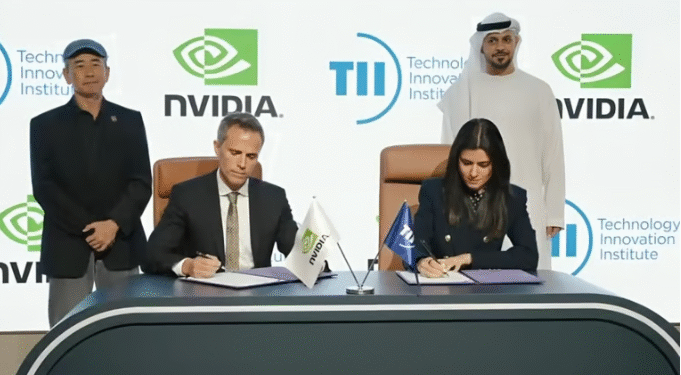The emirate’s Technology Innovation Institute (TII) has joined forces with NVIDIA to create the Middle East’s first joint research lab focused on AI and robotics.
The partnership establishes the TII-NVAITC Joint Lab for AI and Robotics, which will serve as a major hub for developing advanced AI models, robotics platforms, and humanoid technologies. This collaboration brings together TII’s proven track record in AI development with NVIDIA’s world-class computing power and robotics expertise.
NVIDIA Expands Global Research Network to Abu Dhabi
This marks NVIDIA’s first AI Technology Center (NVAITC) in the Middle East with a dedicated robotics focus. The company already operates similar centers with universities like Carnegie Mellon and the University of Pittsburgh, but the Abu Dhabi lab breaks new ground by combining AI research with physical robotics applications.
Dr. Najwa Aaraj, CEO of TII, signed the agreement alongside Marc Domenech, NVIDIA’s Regional Director for Enterprise in the META region. The signing ceremony took place at TII’s headquarters, with senior officials from both organizations present.
“This collaboration with NVIDIA marks a major step toward building AI-enhanced robotic systems capable of reasoning, adapting, and acting in complex environments,” said Dr. Aaraj. The partnership will accelerate what researchers call “Physical AI”, the convergence of artificial intelligence with real-world robotic systems.
TII Brings Proven AI Excellence to Robotics Research
TII enters this partnership with significant achievements in AI development. The institute recently launched Falcon 3, which became the world’s most powerful small AI model and topped Hugging Face’s global leaderboard. The Falcon series represents some of the Middle East’s largest and most successful AI models.
The lab will integrate TII’s existing robotics platforms, including robotic arms and delivery robots, with NVIDIA’s accelerated computing systems. Research will focus on several key areas:
- Large-scale robotic learning and control systems
- Integration of large language models with robotic platforms
- Development of humanoid robot technologies
- Real-time robotic system hardware and software
Carlo Ruiz, Vice President of Enterprise Solutions at NVIDIA, highlighted the significance of expanding into robotics for the first time in the Middle East. “By working with TII in Abu Dhabi, we are expanding the scope of these centers into robotics for the first time in the Middle East – helping researchers and innovators accelerate breakthroughs that will shape the future of intelligent systems.”
Strategic Impact on Middle East Technology Leadership
This partnership positions Abu Dhabi as a major player in the global robotics industry. The lab builds on the UAE’s broader strategy to become a leader in emerging technologies, with significant investments in AI research and development.
The collaboration also emphasizes open innovation and knowledge sharing. Both organizations plan to contribute to open-source initiatives and share research findings with the global scientific community. This approach could accelerate robotics development worldwide while establishing the Middle East as a key contributor to the field.
The lab’s focus on practical applications means research will target real-world problems rather than purely theoretical advances. TII’s existing field-tested robotic components provide a strong foundation for developing commercially viable solutions.
The establishment of this lab adds the Middle East to the global network of advanced robotics research centers. With NVIDIA’s existing partnerships in the United States and other regions, the Abu Dhabi facility will contribute to a worldwide ecosystem of robotics innovation.
The partnership also demonstrates how international collaboration can accelerate technological progress.
Industry experts expect this collaboration to produce significant advances in humanoid robotics, industrial automation, and AI-powered robotic systems within the next few years. The combination of substantial funding, proven research capabilities, and cutting-edge technology creates ideal conditions for breakthrough discoveries.
The success of this partnership could inspire similar collaborations across the Middle East and North Africa region, potentially establishing the area as a major hub for robotics and AI research.














